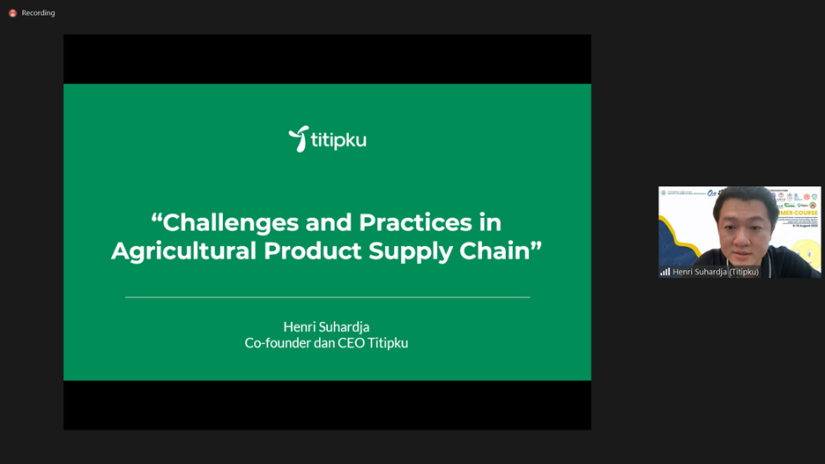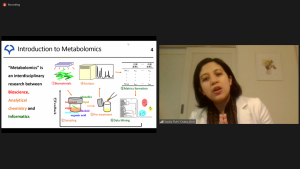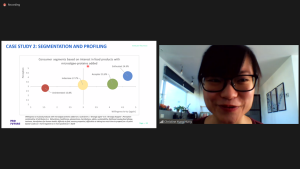
The Summer Course organized by the Faculty of Agricultural Technology UGM has entered its 5th day on Friday, August 12, 2022. The series of events on the third day started at 08.00 (GMT+7) and finished at 17.00 (GMT+7). In the fifth day, we discussed about Management and Supply Chain. There four sessions that deliverd by Mr. Henri Suhardja, Dr. Atris Suyantohadi, S.T.P., M.T, Assoc. Prof. Sastia Prama Putri, Ph.D, and Prof. Christine Hung.
The first session was delivered by Mr. Henri Suhardja with Challenges and Practices in Agricultural Product Supply Chain as the topic. As a founder of Retail Start Up Titipku, he explained how his platform solved agricultural supply chain problems. He told us that Titipku help merchant sell online, like Instacart, by bringing customers traffic and providing personal shopper for delivery services. Beside that, Titipku helps merchant organize better order and payment, also help merchant get access to cheaper inventory and capital.
 The second session we discussed about Smart Agricultural Enterprise Development from Soybean Farming, Post Harvesting and Agroindustry of Tempeh. This session was delivered by Dr. Atris Suyantohadi, S.T.P., M.T. He explained to us that Indonesia is the origin producer of tempeh, but ironically soybean productivity in Indonesia only on the average number. To increase national soybean productivity system, there are development ideas such as implementing modern technology on soybean production and develop the collaboration between farmers and multinational industry. As a Founder of Attempe Agroindustry, Dr. Atris also showed us tempeh production process. Tempeh is already known worldwidely because of its delicious tastes and nutritions. Tempeh may also the commodity key for Indonesia’s lacking economy solution. Nowadays, tempeh industries are still a small scale household industry. But in the future, as young generation, it is our hope and duty to make tempeh industries go globally.
The second session we discussed about Smart Agricultural Enterprise Development from Soybean Farming, Post Harvesting and Agroindustry of Tempeh. This session was delivered by Dr. Atris Suyantohadi, S.T.P., M.T. He explained to us that Indonesia is the origin producer of tempeh, but ironically soybean productivity in Indonesia only on the average number. To increase national soybean productivity system, there are development ideas such as implementing modern technology on soybean production and develop the collaboration between farmers and multinational industry. As a Founder of Attempe Agroindustry, Dr. Atris also showed us tempeh production process. Tempeh is already known worldwidely because of its delicious tastes and nutritions. Tempeh may also the commodity key for Indonesia’s lacking economy solution. Nowadays, tempeh industries are still a small scale household industry. But in the future, as young generation, it is our hope and duty to make tempeh industries go globally.
The third session was delivered by Prof. Sastia with Metabolomics Application to Solve the Problem of Food Loss in Supply Chain as the topic. She explained to us how metabolomics solved food loss with its interdisciplinary research between bioscience, analytical chemistry and informatics. The application of metabolomics for food production such as investigating the cause of disease in plant or aquaculture products, aid systematic and make postharvest management become effective also best to quality improvement. Metabolomics also can be applied to various food products such as natural food products or processed/fermented food products. The food metabolomics application can be used for component analysis, quality improvement, authenticity assessment and diet monitoring.
 The last session was delivered by Prof. Christine Yung Hung, Ph.D. The topic was about Consumer Behavior and Marketing Analytics. She explained to us that studying consumer behavior is important because it can assess consumers’ needs and wants and also can understand the impact of health and sustainability. She told us that variation size of a beverage package is marketing strategy so one of the size can chosen more often when consumers compromise the options and it called the compromise effect. She also taught us about other marketing theory and analysis through many study cases, so we could understand the topic thoroughly.
The last session was delivered by Prof. Christine Yung Hung, Ph.D. The topic was about Consumer Behavior and Marketing Analytics. She explained to us that studying consumer behavior is important because it can assess consumers’ needs and wants and also can understand the impact of health and sustainability. She told us that variation size of a beverage package is marketing strategy so one of the size can chosen more often when consumers compromise the options and it called the compromise effect. She also taught us about other marketing theory and analysis through many study cases, so we could understand the topic thoroughly.
